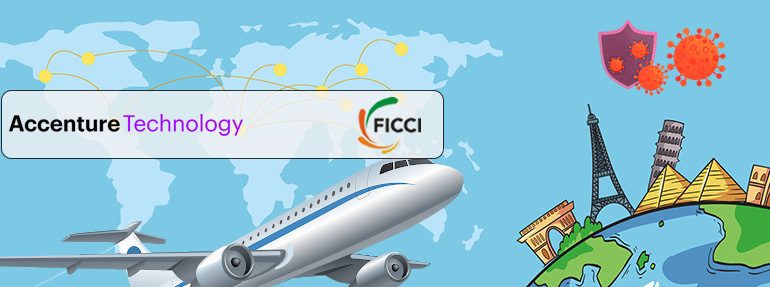
Cross-industry strategies and learning could help accelerate the travel industry’s reset
The travel industry, contributing nearly 10 percent of global GDP and one of the worst affected by the COVID-19 pandemic, is in the midst of a reset. With confidence in travel rising as governments roll out vaccines, the travel industry is seeing demand growing, albeit slowly. How should it move forward?
We believe that travel could do well to take a page from other industries that managed to rehaul themselves through crisis, including the current one. In the first of a series on cross-industry recovery learnings, we look at how the healthcare and the government services sectors could inspire travel companies.
Transforming processes to serve travellers both efficiently and empathetically
The imperatives of speed and scale in response to a completely altered environment that included physical distancing mandates could provide cues. Travel could follow the healthcare and the government services’ digital mobilisation in the face of an unprecedented surge in demand for emergency care services.
AI-enabled virtual agents (VAs) for better interactions: The last-minute cancellations or changing schedules during sudden travel restrictions, for example, could be managed by these VAs. Hospitals used robots and VAs to detect the cases that needed immediate attention and screened patients for COVID-19 symptoms. Not only did some hospitals invest in such AI-based solutions for front-end operations but also for improving the efficiency of back-end operations, digitizing the supply chain and automating workflows to free up doctors from rote work.
Technology could change how travel companies deliver online services too. For example, an AI-based solution analyses voice signals in phone conversations to help call centre agents of healthcare companies be more empathetic, creating better patient-hospital interactions—something for travel companies to emulate while designing primarily digital interactions amidst social distancing needs.
These improvements in the delivery of healthcare services at scale through technology could be pointers for travel companies too. The digitalization of front-end and back-end operations could help them create superior customer experiences that are touchless and contactless.
Extending reach to underserved areas: One of the biggest benefits of virtualization is the possibility of increasing demand for travel services across consumer segments and create new ways for customer engagements. Take a leaf from the way tele-health services from leading hospitals to extend their reach to underserved areas and reducing the burden on in-patient departments through remote monitoring of chronically ill patients or the elderly with the help of smart wearables. Similarly, providing engaging smart wearables or apps to passengers or hotel guests could help provide relevant information without the need for immediate face-to-face interactions. Why not consider “tele-travel” services to engage potential travellers with people in beautiful and remote locations, thereby stimulating travel dreams? How about emulating clinics providing physiotherapy services through VR and consider providing VR travel, for example as adoption of VR can enhance the overall experience of travellers?
Again, take a look at what is happening in healthcare where insurance companies are tying up with cab companies such as Uber and Lyft to offer to take people, especially the elderly, to the hospital for medical appointments. In the US, missed medical appointments run into millions and adversely affect the payers. Lyft had also rolled out an initiative to allow automated phone calls for users without a smart phone. If health insurance and logistics companies can come together in innovative ways so can travel companies.
Build an ecosystem for travellers’ health and safety through cross-industry collaboration
Electronic health records (EHR) for hassle-free travel: EHRs is another healthcare avenue that could help create safer travel experiences and encourage more travel. However, sharing of EHRs implies a partnership between hospitals, doctors, and various travel industry stakeholders.
For example, if airline passengers could easily access their medical records digitally or on smart cards, it would make it easier for them as well as airlines, immigration authorities and hospitals in the destination country to manage the traveller’s health information needs.
Immunity and Identity solutions: Immunity credentials, proof-of-health verifications and other identity solutions such as biometric wallets that give information whether the person has necessary vaccination against the COVID virus are likely to be used extensively. These will act as “immunity passports” and may become mandatory for travellers entering a country.
This is where we see the convergence of governments, healthcare providers and travel players, enabled by technology and becoming an important driver of travel revival. For example, the World ID Travel, is a platform that brings together government, airlines and airports to facilitate air travel while safeguarding the health and safety of travellers, employees and citizens.
Integrate into the traveller’s daily life: At a more strategic level, collaboration with other industries such as healthcare, insurance, restaurants, and logistics, will enable travel companies to look beyond the ticket and tariff framework and be part of the everyday life of their customers. This could create synergies for new revenue streams.
Build trust to maintain primacy of data privacy and effective data sharing
Collaboration will be most effective through data integration. We believe this sharing of health records (EHR) and personal identification data (albeit without revealing personal information) may well be the pivotal factor in driving the return of people to physical workplaces and to travel. Again, technology will play a role in creating the required collaboration platforms. For example, in South Korea, domestic airline passengers can use digital identity through a government app for boarding a flight. In the UAE, citizens can access government services through an app called UAE Pass app and even digitally sign documents.
However, as virtual is becoming mainstream and customers seek more than mass personalization and black box services, data privacy concerns will be one of the biggest challenges for travel as it has been for healthcare. An Accenture survey reveals that 70% of healthcare consumers are worried about data privacy and commercial tracking of their online activities, location and interests. Organizations therefore need to build trust with their users by offering more transparency about data collection and other important topics like pricing. They could educate people about how the data is used or leveraged for the larger public safety.
Conclusion: Even with the promise of better immunity with vaccines, there is no going back to pre-pandemic times. Travel companies, like health organizations, will need to harness technology to create immersive and meaningful digital experiences for their customers, co-create those experiences with them, and leverage AI-human collaboration to not only transform operations but also re-imagine what they can do for and with their customers.
Technology has enabled us to fight the pandemic. Leverage technologies such as Cloud, AI, IoT and Blockchain for contact tracing physical distancing, bring new vaccines to market at unprecedented speed, monitor their transportation in real time and design the implementation of the vaccination programmes. Technology is underpinning the recovery of business. The travel industry must seize this unprecedented opportunity to reset and re-imagine.
In the next blog, we will explore financial services industry and look at how travel could consider the journey of recovery that the financial services companies undertook to not just survive the global financial crisis more than a decade back but to rebuild as digital business.








